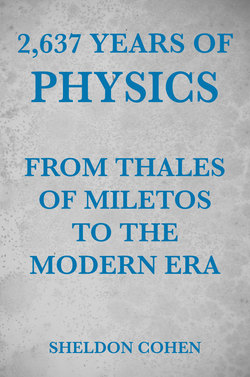Читать книгу 2,637 Years of Physics from Thales of Miletos to the Modern Era - Sheldon Cohen - Страница 13
На сайте Литреса книга снята с продажи.
Democritus (460-370 BCE)
Оглавлениеhonors a man whose atomos philosophy comes close to modern physics theory. Although he was not the first to espouse atomism, his use of this concept allowed him to develop a much more detailed, and what would prove to be a much more insightful view of the way the world functioned physically.
He believed that space was a vacuum, but in spite of this property of emptiness it could be thought of as existing as did the visual realities of our world. In the void of space, and in the world around us, there were an infinite number of atoms, so small that they were incapable of further division. These atoms made up the physical world. He postulated that all changes occurring in the universe were merely dependent on the density of the atoms and their movement in relation to each other. Nature itself was nothing more than a complex interaction of atoms that followed the laws of mathematics. Initially atoms moved incoherently, but over time they would randomly interact and combine in a multitude of ways responsible for the origin of the universe and the laws of mechanics and motion. As time would subsequently prove, this was a very advanced thought.
Thinking was expanding and getting closer to the mark.
He made many contributions to geometry and is credited with mathematical ideas that Isaac Newton would define many years later as the integral calculus.
It is little wonder that the Greeks thought to name a nuclear research facility after Demorcratus. He was greatly ahead of his time.
Plato (429-347 BCE) and
